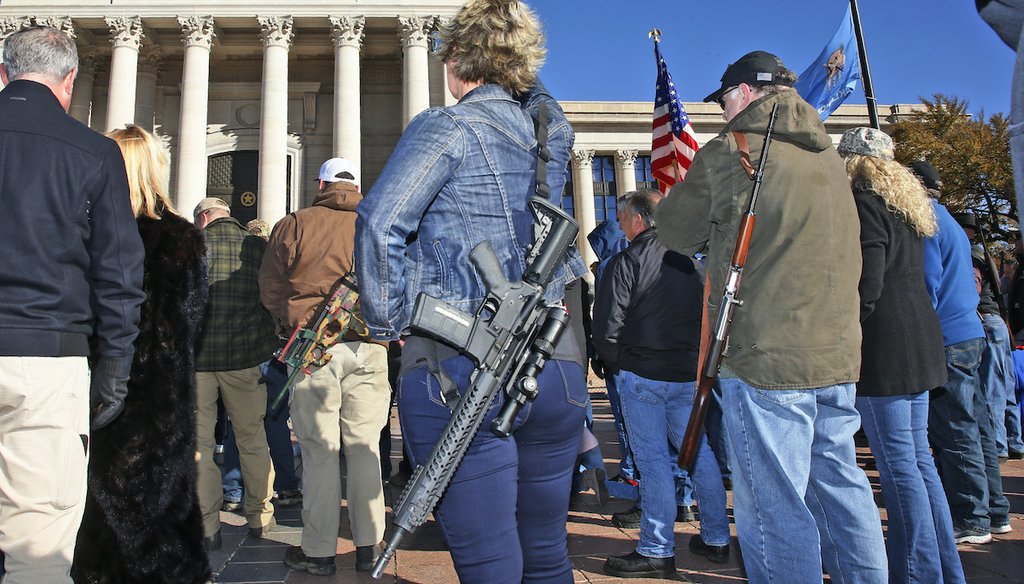Stand up for the facts!
Our only agenda is to publish the truth so you can be an informed participant in democracy.
We need your help.
I would like to contribute

Leslie Nessmith, center, of Edmond, Okla., attends a rally at the state Capitol to mark the start of a new law that allows most adults in Oklahoma to carry a firearm in public without a background check or training, Nov. 1, 2019, in Oklahoma City. (AP)
If Your Time is short
-
State legislatures over the past decade have increasingly passed laws to allow eligible individuals to conceal carry a firearm without a permit. When new laws that passed in 2022 take effect, permitless carry will be the law in half the states.
-
Permitless carry laws don’t change the requirement that individuals who buy a gun from a federal licensed dealer must undergo a background check.
-
Multiple experts told us that there isn’t enough long-range data to evaluate the impact of permitless carry on gun violence.
People who want to drive a car, go fishing or shampoo peoples’ hair at a blow dry bar typically have to obtain a government permit or license. But an increasing number of states no longer require residents to obtain a permit from a local law enforcement agency to carry a concealed gun.
Twenty-five states now have permitless concealed carry laws, most of them passed since 2015, with a spike in 2021 and 2022. In March alone, governors signed permitless carry laws in Ohio, Indiana and Alabama that will take effect over the next several months. Georgia Gov. Brian Kemp signd a permitless carry bill April 12.
Nationwide, these permitless laws don’t mean that every adult can carry a concealed firearm anywhere they want. There are still bans on guns in specific facilities such as K-12 schools, and states typically ban people with a record of serious criminal offenses from carrying guns. But it does mean that eligible adults no longer have to go through the process of applying for a permit.
The National Rifle Association and other gun rights groups have made it a priority to advocate for laws that do away with permit requirements that they find burdensome, including requirements for training. Supporters of permitless carry refer to it as "constitutional carry" because of their interpretation that the Second Amendment guarantees the right to carry firearms.
Opponents say that the term "constitutional carry" is a misnomer and that the Constitution doesn’t prevent a state from requiring permits. Advocates for gun control note that in the 2008 Heller ruling that upheld the right of individuals to bear arms, conservative Supreme Court Justice Antonin Scalia wrote that the "Second Amendment right is not unlimited" and that concealed weapons prohibitions have been upheld.
Sign up for PolitiFact texts
Law enforcement groups have often opposed permitless carry, saying they fear it makes police officers’ jobs harder and poses safety risks to the public.
Meanwhile, partisan polarization is driving where regulations are being rolled back, despite public polling that shows people want more controls on who carries a gun. Experts say the long-term effects of lifting regulations on permitless carry are unknown.
In the late 20th century, some states began to grant law enforcement discretion to issue permits, often called conceal carry permits, to people who passed background checks and received safety training or demonstrated a need to carry hidden guns in public.
There are two main approaches to permit laws: "shall issue" and "may issue." States that have "shall issue" laws require law enforcement officials to give someone a permit if they meet a basic list of requirements, such as completing a training course or meeting an age requirement. In "may issue" states, law enforcement officials have more discretion to reject an applicant. For example, a police chief could reject people with a history of domestic violence or drunkenness even if they had not been convicted of a felony.
Until 2011, Vermont was the only state to not require residents to obtain a permit to carry a concealed firearm. Over the past decade, an increasing number of states have passed permitless carry laws even though law enforcement associations opposed it.
Police leaders said that permit laws allowed police to make sure that applicants met at least some basic requirements, including training in how to handle a firearm. While such requirements were often less than stringent, they did lead to some rejections. In Ohio in 2021, county sheriffs issued 202,920 licenses and denied licenses to 2,668 applicants who failed to meet state-mandated requirements.
Gary Wolske, president of Ohio’s Fraternal Order of Police, wrote in an op-ed in the Columbus Dispatch that his state’s concealed carry law struck the right balance of constitutional protections and public safety.
"It’s a clear nod to individual freedom, embedded in the gun rights of the Second Amendment as well as similar protections in the Ohio Constitution," he wrote. "But it also takes seriously the government’s responsibility for public safety and, in that equation, it’s the ever-present compromise."
Charmaine McGuffey, sheriff in Hamilton County, which includes Cincinnati, said people without training on how to handle a gun are a risk to public safety.
"I have many, many years of firearm training and I am usually at 90% accuracy," McGuffey told Cincinnati’s WLWT in March. "In a high-stress situation, my accuracy or that of any trained officer will go down by about 40%. This is something that needs to be considered when we allow untrained and unlicensed individuals to walk the streets of Hamilton County with concealed weapons."
The states that have approved permitless carry laws are: Alabama, Alaska, Arizona, Arkansas, Idaho, Indiana, Iowa, Georgia, Kansas, Kentucky, Maine, Mississippi, Missouri, Montana, New Hampshire, North Dakota, Ohio, Oklahoma, South Dakota, Tennessee, Texas, Utah, Vermont, West Virginia, and Wyoming.
The Ohio law that takes effect in June means that gun owners no longer have to complete eight hours of training. And if stopped by law enforcement, they no longer have to "promptly inform" officers that they are carrying a gun.
Wolske said the new law puts the onus on officers pulling over people during traffic stops to ask if they are carrying a gun. That could put people on the defensive and escalate situations, Wolske said.
The Buckeye Firearms Association, which advocated for the Ohio permitless law, argued that bearing arms is a constitutional right, so government should not be able to mandate anything, "including fees, training, licensing, etc. We support the idea of training, but we do not support mandated training."
The new permitless carry laws have generally passed along party lines with only Republican support. There were exceptions in some states, however. Indiana State Sen. Kyle Walker, a Republican and lifetime NRA member, tweeted in March that he opposed the permitless carry bill because of opposition by Indiana law enforcement associations and his constituents.
It’s important to note that state permitless laws don’t change federal law that requires federally licensed gun sellers to run background checks for sales to an unlicensed buyer. The law bans firearm transfers to people who were convicted of serious crimes or committed to a mental institution.
Private sellers without a federal license, though, don’t have to meet the same requirement for background checks. And President Joe Biden’s campaign promise to require background checks on all sales has stalled due to opposition in the Senate.
States are passing laws to allow permitless carry despite polls showing the majority of respondents oppose such policies.
Pew Research Center found in 2021 that majorities in both parties oppose allowing people to carry concealed firearms without a permit. Gallup found in 2021 that 52% of respondents wanted stricter gun laws. Some state polls, including in Texas and Georgia, show the majority of respondents want individuals to obtain a license before carrying a concealed weapon.
Amid support for gun control, why then do we see states continuing to relax gun control laws?
The answer lies in partisan politics, said Kristin A. Goss, a Duke University professor of public policy and political science.
"In recent years, the parties have ‘sorted’ over gun policy, meaning that if you tell me your position on gun control, I can very reliably guess your political party. As a result of this sorting, Republican lawmakers no longer have to worry about alienating, say, pro-regulation women, and Democrats don’t have to worry about alienating, say, gun-owning men," Goss said. "As the parties have diverged, so too have state gun laws. With minor exceptions, red states (like Ohio, Indiana, and Alabama) have been loosening their gun laws – particularly around concealed carry – while blue states have been tightening them."
The U.S. Supreme Court may force one of the states with the strictest gun laws, New York, to change its century-old permit law. The court is expected to rule by June on the law that requires anyone who applies for a license to carry a concealed handgun to show proper cause.
Multiple experts told us that there isn’t enough long-range data to evaluate the impact of permitless carry on gun violence.
David Hemenway, director of the Harvard Injury Control Research Center, said there are many unanswered questions about the impact of permitless carry laws. It’s also a challenge for researchers to determine the impact of permitless carry because multiple factors can influence gun violence.
"The goal is randomized control trials, where everything is constant and you just change permitless and not allow anything else to change over 10 years and see what happens," Hemenway. But in reality, "everything is changing."
Proponents of looser gun laws sometimes cherry pick data to match their viewpoint. In 2016, West Virginia passed a law that allowed most individuals over the age of 21 to carry a firearm without a permit or safety training. A popular Facebook post then claimed that "violent crime rate dropped like a rock following West Virginia’s adoption of permitless carry." PolitiFact rated that statement Mostly False.
The reality is that crime numbers varied a good bit after West Virginia allowed permitless carry. After an initial decline in 2017 and 2018, violent crime in West Virginia rose again in 2019 and 2020, and then went back near its level prior to the law being passed. Meanwhile, the homicide rate, which experts suggested as a better indicator, did not see the big drops in 2017 and 2018 that existed for violent crime. And like the violent crime rate, the homicide rate in West Virginia rose in 2019 and 2020.
Emma Fridel, a Florida State University criminologist, in a 2020 study found that firearms homicide rates are higher in permissive concealed carry states. But more research is needed to evaluate the effect of recently passed permitless carry laws, she said.
Fridel said "researchers need several years of homicide data both before and after the passage of the law to determine if permitless carry has any impact on crime rates."
RELATED: Legislation to require background checks for all gun sales stalls
RELATED: Murders spiked in 2020. Why?
RELATED: Did violent crime in W.Va. fall after permitless carry was enacted?
RELATED: All of our fact-checks about guns
Our Sources
Alabama, House Bill 272, 2022
Indiana, House Bill 1296, 2022
Ohio, Senate Bill 215, 2022
Gov. Brian Kemp, Tweet, April 1, 2022
The Trace, 32 States Let People Carry Guns Without Learning How to Shoot One, Jan. 25, 2022
The Trace, Understanding ‘Constitutional Carry,’ the Gun-Rights Movement Sweeping the Country, Feb. 28, 2017
Pew Research Center, Key facts about Americans and guns, Sept. 13, 2021
Gallup, Guns, 2021
Pew, No Permit, No Problem: More States Allow Residents to Carry a Hidden Gun, Dec. 6, 2021
Atlanta Journal-Constitution, Gov. Kemp signs bill allowing concealed carry of handguns without a license, April 12, 2022
Texas Tribune, UT/TT poll: Majority of Texans oppose permitless carry, would ban police chokeholds and taxpayer-funded lobbying, May 3, 2021
Washington Post, Nearly half the country requires no permit to carry a concealed weapon — and it’s a growing trend, March 19, 2022
CNN, 'They will come to know the lives they didn't save': States forge ahead with permitless carry legislation despite law enforcement opposition, March 5, 2022
RAND, The Effects of Concealed-Carry Laws, April 22, 2020
Pew Research Center, Key facts about Americans and guns, Sept. 13, 2021
Indianapolis Star, Gov. Holcomb signs bill eliminating permit requirement to carry handguns in Indiana, March 21, 2022
Columbus Dispatch, FOP president: Ohio lawmakers ignoring 'concerns of the men and women who keep your family safe' Dec. 22, 2021
Giffords Law Center to Prevent Gun VIolence, Concealed Carry, Accessed April 1, 2022
Everytown for Gun Safety, Permitless carry, Updated March 23, 2022
Courier Journal, Kentucky gun owners: Here's what Indiana's new no-permit law means for you, March 28, 2022
NRA, NRA Achieves Historical Milestone as 25 States Recognize Constitutional Carry, April 1, 2022
NRA, The Free and Fearless 20: Permitless Carry Wave Sweeps the Nation, April 26, 2021
Urban, What Happens When States Adopt Permitless Carry Laws? Sept. 4, 2019
World Population Review, Driving Age by State, 2022
Findlaw, Fishing laws by state, 2022
U.S. Supreme Court, D.C. vs Heller, 2008
Ohio Attorney General, Annual CCW Statistics, 2021
PolitiFact, Do gun background checks work? What the research shows, Jan. 2, 2020
Email interview, Dean Rieck, executive director of the Buckeye Firearms Association, March 31, 2022
Email interview, Sarah Harris, spokesperson for Everytown for Gun Safety, March 31, 2022
Telephone interview, Allison Anderman, Senior Counsel and Director of Local Policy at Giffords Law Center to Prevent Gun Violence, March 31, 2022
Email interview, Emma Fridel, Florida State University criminologist, April 1, 2022
Telephone interview, David Hemenway, director of the Harvard Injury Control Research Center, April 4, 2022
Email interview, Rosanna Smart, an economist who evaluates gun studies for RAND, April 4, 2022
Telephone interview, Gary Wolske, Ohio Fraternal Order of Police president, March 31, 2022
















































